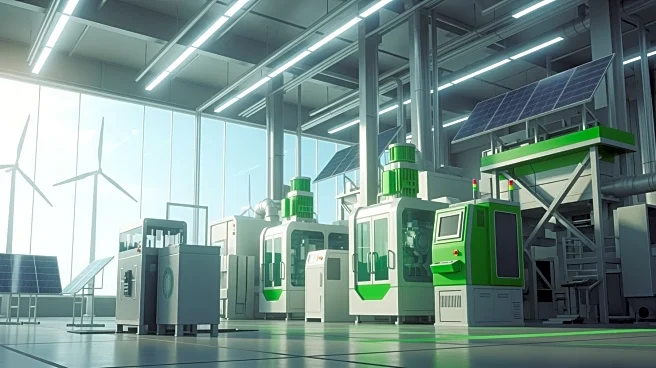What's Happening?
The European Union is advancing its clean technology sector through the implementation of the Net Zero Industry Act and the Clean Industrial Deal. These initiatives aim to enhance the EU's competitiveness
in clean tech by establishing faster permitting processes and supporting strategic projects across net-zero technologies. The Clean Industrial Deal has mobilized over €100 billion to expand measures on skills and education, while the Innovation Fund has channeled more than €12 billion into large-scale projects. Despite these efforts, regulatory bottlenecks and private capital uncertainty have slowed the transition from planning to scaled deployment, with most benefits expected to materialize by 2030.
Why It's Important?
The EU's focus on clean technology is crucial for achieving its net-zero goals and reducing dependency on foreign countries for clean tech solutions. By investing in strategic projects and enhancing regulatory frameworks, the EU aims to strengthen its industrial base and secure supply chains. However, the rapid advancements by the US, China, and India pose a risk to the EU's future competitiveness. The success of these initiatives could lead to increased domestic production and innovation in clean technologies, potentially positioning the EU as a leader in the global clean tech market.
What's Next?
The EU must prioritize increasing investment capacity and coordinating cleantech policy across member states to counter the trend of becoming a clean-tech importer. Efforts should focus on developing supply chains with potential for leadership, such as wind, electrolysers, and batteries. Additionally, addressing grid capacity bottlenecks and incentivizing clean technology adoption are essential steps to ensure the successful implementation of the Net Zero Industry Act and the Clean Industrial Deal.
Beyond the Headlines
The EU's clean tech initiatives highlight the need for a European rather than national approach to implementation. The slow pace of grid and infrastructure expansion, coupled with high upfront costs and policy uncertainty, underscores the challenges in scaling domestic manufacturing. The EU's strategic clarity must be matched by operational speed and agility to compete effectively in the global clean tech market.










